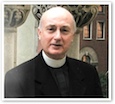Periclean oration and its opposite
- FATHER GEORGE RUTLER
Lost is classical reserve, and, in the Church, there is a fatal weakness for inflated rhetoric.
 Pericles
Pericles495-429 B.C.
The Funeral Oration of Pericles, the statesman who helped make Athens great, honored the soldiers who died in the first phase of the Peloponnesian War, during which Athens took on Sparta.
(If you will pardon the prejudice, that was like New York taking on Chicago.) Given in the winter of 431–430 B.C., Pericles' oration extolled Athenian civilization at its height on the precipice of destruction. (The Athenian fleet would later sink into the waters off Aegospotami.) It is a model of eloquence, as transcribed in a very difficult Greek by the historian Thucydides. Esoteric grammarians enjoy its display of such devices as anacoluthon, asyndeton, hyperbaton, and the rhythmic proparoxytone that is absent from the rhetoric of contemporary politicians and prelates, although it occurs unintentionally at times in text messages and various forms of social media.
Imagine listening to this, declaimed without a microphone, over the bones of the dead: "For we have a peculiar power of thinking before we act, and of acting, too, whereas other men are courageous from ignorance but hesitate upon reflection. And they are surely to be esteemed the bravest spirits who, having the clearest sense of both the pains and the pleasures of life, do not on that account shrink from danger."
Abraham Lincoln's soul absorbed the Athenian ideal, and his address at Gettysburg has been compared to the Periclean oration, even though it had only 272 words while an English translation of Pericles has about 3,375. Pericles would die of the plague the year after he spoke, and Lincoln would be shot a year and a half after he left the cemetery in Pennsylvania.
The non-dogmatic and non-threatening oratory of our current ecclesiastical culture would have better results if it simply translated Saint Peter's lumpish Aramaic: "Save yourselves from this corrupt generation."
Those speeches were animated by natural virtue, moved by classical piety for lives heroically sacrificed for high ideals. But for the greatest speech of a mortal, I nominate the Pentecost sermon of Saint Peter (Acts 2:14-41) with its sequel, Acts 3:12-25, translated into about 532 English words. Peter's fishing village of Capernaum boasted no school of rhetoric, and Jerusalemites mocked the Galilean accent of his Aramaic, which was not an elegant language to begin with. (Ignore the dangling participle; even Pericles used it from time to time.) When Peter had finished, more than 3,000 people begged to be baptized.
There are too many speeches today, and public figures spout off daily, often bereft of the Athenian custom of "thinking before we act." Lost is classical reserve, and, in the Church, there is a fatal weakness for inflated rhetoric, naïve instead of innocent and optimistic instead of hopeful: New Pentecost, New Springtime, New Evangelization. Perhaps because of such delusions, in just the last half-dozen years, the number of Millennials — who are the future of our culture — receiving ashes at the start of Lent has dropped from 50% to 41%. The non-dogmatic and non-threatening oratory of our current ecclesiastical culture would have better results if it simply translated Saint Peter's lumpish Aramaic: "Save yourselves from this corrupt generation."
 This is Meaghen Gonzalez, Editor of CERC. I hope you appreciated this piece. We curate these articles especially for believers like you.
This is Meaghen Gonzalez, Editor of CERC. I hope you appreciated this piece. We curate these articles especially for believers like you.
Please show your appreciation by making a $3 donation. CERC is entirely reader supported.

Acknowledgement
 Father George W. Rutler. "Periclean oration and its opposite." From the Pastor (April 22, 2018).
Father George W. Rutler. "Periclean oration and its opposite." From the Pastor (April 22, 2018).
Reprinted with permission from Father George W. Rutler.
The Author
 Father George W. Rutler is the pastor of St. Michael's church in New York City. He has written many books, including: The Wit and Wisdom of Father George Rutler, The Stories of Hymns, Hints of Heaven: The Parables of Christ and What They Mean for You, Principalities and Powers: Spiritual Combat 1942-1943, Cloud of Witnesses — Dead People I Knew When They Were Alive, Coincidentally: Unserious Reflections on Trivial Connections, A Crisis of Saints: Essays on People and Principles, Brightest and Best, and Adam Danced: The Cross and the Seven Deadly Sins.
Father George W. Rutler is the pastor of St. Michael's church in New York City. He has written many books, including: The Wit and Wisdom of Father George Rutler, The Stories of Hymns, Hints of Heaven: The Parables of Christ and What They Mean for You, Principalities and Powers: Spiritual Combat 1942-1943, Cloud of Witnesses — Dead People I Knew When They Were Alive, Coincidentally: Unserious Reflections on Trivial Connections, A Crisis of Saints: Essays on People and Principles, Brightest and Best, and Adam Danced: The Cross and the Seven Deadly Sins.




